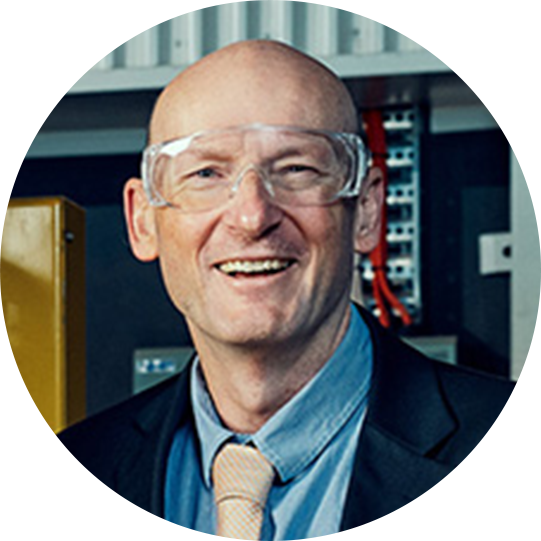
In more than 30 years as a materials researcher and polymer scientist, Deakin University’s Professor Russell Varley has worked to develop high performance composite materials for industries ranging from aerospace, automotive and oil and gas.

In more than 30 years as a materials researcher and polymer scientist, Deakin University’s Professor Russell Varley has worked to develop high performance composite materials for industries ranging from aerospace, automotive and oil and gas.
How can innovation support industries that we all rely on to supply our basic needs? Imagine if there was a way to make trucks and aeroplanes lighter to save on fuel and battery power. What about a self-repairing material that increases the lifespan of infrastructure?
It's possibilities like these that Professor Russell Varley and his team of researchers at Deakin's Carbon Nexus research facility are making a reality.
‘Lightweight structural materials and self-healing coatings and composites are changing the world,’ Prof. Varley, Director of Research and Research Group leader at Carbon Nexus, says.
‘Every industry you can think of will benefit from using composite materials, lightweight structures and components. Low-cost, high-performance carbon fibre is revolutionising weight sensitive industries and making carbon fibre composites possible for a whole new range of industries.’
Globally recognised as an expert in polymer composite materials (materials made from mixing one or more substances together to create a product with qualities superior to the original substances, like extra strength or lighter weight ), Prof. Varley says polymer composites are reducing fuel consumption, increasing resource efficiency and enabling green energy solutions such as wind power and hydrogen.
‘Carbon fibre provides the outstanding strength to weight ratio, while the polymer matrix, the resin, binds the fibres together, allowing the fibre to fulfil its promise. Because the fibre is so strong, if carbon fibre composite fails, it’s usually because the resin has failed,’ Prof. Varley says.
Prof. Varley and his team’s work in developing self-healing polymer coatings offers a way to extend the life of polymers such as pipelines and other infrastructures exposed to harsh environments that are difficult and dangerous to repair manually.
‘Self-healing materials reduce the maintenance costs of structures and facilities and can greatly prolong service-life, making these assets more profitable.,’ Prof Varley says.
Working with Malaysia’s oil and gas company, PETRONAS, the team has developed a robust and durable coating that autonomously repairs itself at room temperature and only requires moisture in the air to activate healing.
‘In this way, the integrity of coatings and structures is maintained during operation, leading to longer service life of the materials and large reductions in cost for maintenance and inspection,’ says Prof. Varley.
From the very beginning, Prof. Varley’s research career has melded fundamental research with industry-driven outputs.
The first in his family to attend university, he graduated with Honours in Chemistry and began work at Yorkshire Chemicals, a Melbourne-based manufacturer of chemicals for the textile and leather industry. Wanting to expand his research experience, he joined CSIRO as an experimental scientist and undertook his PhD.
Prof. Varley’s career has balanced fundamental research with a passion for creating lasting impact and positive change through the development of valuable intellectual property for industry and solving long-standing industry challenges.
‘I never chose chemistry or science as a career. It chose me,’ he says, but over time the feeling has become mutual.
‘I love the discovery of new things, observing the growth and development of students and researchers, and that feeling of success when an industry partner wants to continue to work with you after the completion of a project.’
He joined Deakin’s Institute for Frontier Materials (IFM) in 2016 as Professor of Composite Materials, bringing with him a global reputation for world-class research in polymer networks, self-healing materials and resin synthesis.
‘I wanted to work at Deakin because of its world class reputation in carbon fibre and composite materials,’ Prof. Varley says.
‘The Carbon Nexus research facility at IFM is unique and provided the opportunity to expand my knowledge of carbon fibre and composite materials whilst leading a team of world class researchers to create the next generation of composite materials.’
Carbon Nexus is the world’s most advanced, industrial scale carbon fibre and composite research facility, supporting the transition to advanced manufacturing and smart system growth. Located in the heart of Deakin’s Future Economy Precinct at the Waurn Ponds campus, Carbon Nexus has collaborated with local and international industry partners including Vestas, PETRONAS, the Ford Motor Company, Boeing and Dow Chemical to produce the first Australian carbon fibre in 2013.
‘Carbon Nexus works across the entire carbon fibre value chain, from spinning the precursor to producing carbon fibre tow and, of course, the carbon fibre composite,’ Prof. Varley explains.
‘Our mission is to work at the intersection of academia and industry to better understand the science and engineering of carbon fibre production and to work with industry partners to transition research into reality.’
Re-imagine your career, connect with industry and make your impact alongside world-leading researchers in one of Australia’s leading research communities.
For more information about any of our researchers please contact Deakin Research.